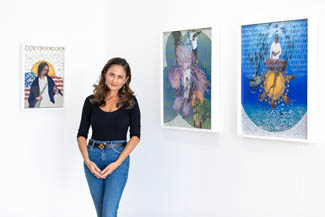
Photo courtesy Dinno Morrow and Above The Equator Gallery |
Born and raised in Hawai‘i where she lives with her husband and son, Melissa Chimera (b. 1972) is a descendant of Filipino and Lebanese immigrants. She studied natural resources management at the University of Hawai‘i, and has worked as a conservationist since 1996.
Chimera’s mixed media paintings and installations are research-based investigations into species extinction, globalization and human migration. Her work implies a nebulous sense of belonging—for both marginalized humans and species alike—akin to the absence of a permanent homeland and the impoverishment we face by their erasure.
Chimera has exhibited throughout the U.S., Asia and the Middle East, published in anthologies and has been reviewed by the Washington Post and Hyperallergic. Her solo and curatorial exhibitions include Remittance (2022) and Migrant (2019) at the Honolulu Museum of Art and The Far Shore: Navigating Homelands at the Arab American National Museum (2018). Other projects include Inheritance: Land and Spirit, for the Sharjah Biennial 9, United Arab Emirates and Moving Cultures, a collaborative art-making train journey between Chinese and Western artists across 2,000 miles of China. Most recently, she produces and hosts two podcasts centering around land, people and immigration: Land & People and Drift: Immigration & Identity in America.
Chimera is the recipient of the Catherine E. B. Cox Award and finalist for the Duke University Lange-Taylor Prize in documentary studies. In 2022, she was Anchorage Museum's artist in residence and University of Toledo's Mikhail Endowment grantee for her work concerning immigrant narratives. Her work resides in the collections of the Arab American National Museum, the Honolulu Museum of Art, and the Hawai‘i State Foundation of Culture and the Arts. |